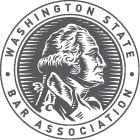Work Group Questions
An ongoing list of inquiries by members of the Bar Structure Work Group submitted to legal experts following their presentations at Work Group meetings.
Question 1
Am I correct that his (Work Group presenter Hugh Spitzer, professor, University of Washington School of Law) position is that: 1) the Article 8, Section IV, requirement that a legislative appropriation is necessary for all funds paid out of the state treasury or "any of [the state's] funds, or any of the funds under its management" (emphasis mine), 2) combined with Article 8, Section V, prohibiting a gift of public funds, means that if bar dues were paid directly to the court, or a court entity the dues would be "public funds" and could only be spent by a legislative appropriation? In other words, bar dues, including possibly section dues, would become public funds and subject to the appropriation process and review by OFM?
Answer: If the WSBA or any of its functions were entirely brought into the Supreme Court itself, such as into the Administrative Office of the Courts or as a new department of the Supreme Court, AND IF nothing were done affirmatively by the legislature to provide for special handling of license fees, then license fees would go into the State Treasury and couldn't be disbursed absent an appropriation. Note that AOG and Court costs (judges salaries, staff costs, etc.) are handled through the normal biennial appropriation process.
However, as I mentioned in my presentation, (1) the legislature can provide that license fees are to be deposited in an account "outside the Treasury but in the custody of the State Treasurer," and in that event the money isn't subject to biennial appropriation but instead is managed and spent according to whatever the statute says, e.g., spent as directed by a board, or by the Supreme Court; OR (2) if the Court were to continue the WSBA as a semi-independent instrumentality of the judicial branch (which it is under current law and which it would be under ESHB 1788), and if by court rule the Court allowed that instrumentality to establish accounts, collect license fees, and disburse those fees, then the license fee receipts would continue to be handled entirely outside the State Treasury or the Treasurer's custody, i.e., off the State's books altogether.
Answer provided by UW law professor Hugh Spitzer following his presentation, "Washington State History and Constitution" at the first Work Group meeting on March 28.






